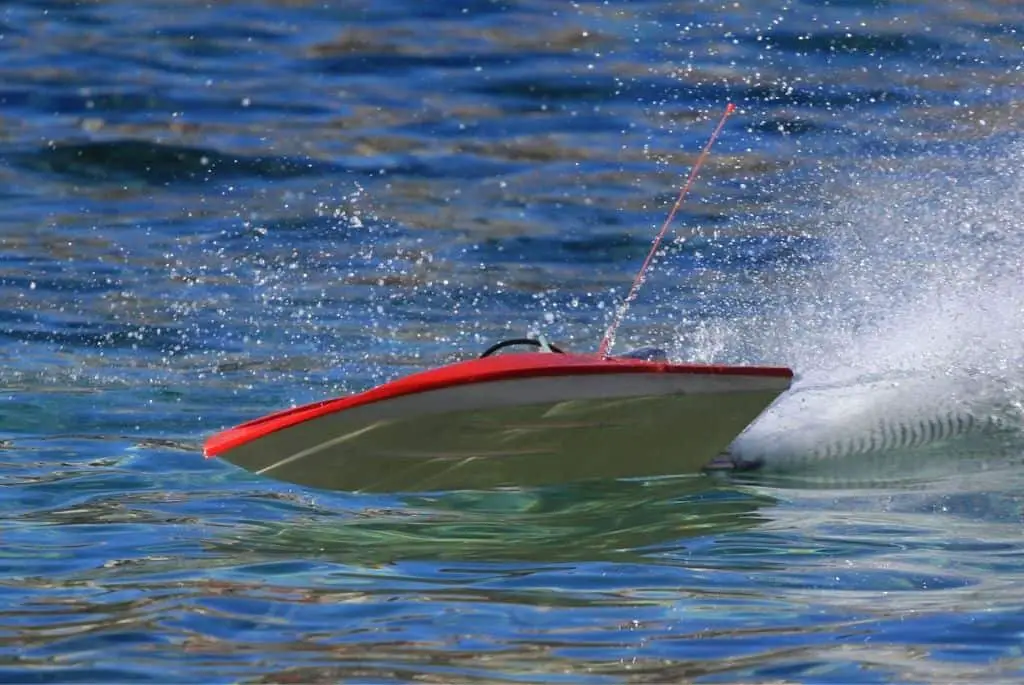
RC boating has become a popular hobby in recent years due to the exhilarating experience it provides. You can take an RC boat out on freshwater with the most basic waterproofing system, but seawater is an entirely different story. Saltwater is both corrosive and rough. So, you should take some precautions before dropping your RC into saltwater.
An RC boat can be used in Saltwater as long as it is built sturdy enough. It needs to be able to tackle the rough conditions in the sea. It is essential to insulate the electronics and metal parts of an RC boat from the salt water to avoid corrosion.
But running an RC boat in plain water is not the same as saltwater. A lot of considerations and precautions are a must in this case.
In this article, I’ll talk about all the problems that might occur while running RC boats in saltwater, and how to deal with them.
Are RC boats Viable on Saltwater?
Most people play with RC boats on calm waters, like lakes and swimming pools, for instance. Most of the cheaper RC boats cannot even handle slightly large waves and end up capsizing on the spot. However, if it is built decently enough, it can effortlessly run-on saltwater.
Not only that, Saltwater even helps boats go slightly faster than freshwater. Most of the regular RC boats will indeed sink in saltwater because of the waves. So, when you are buying, try to get the ones that explicitly say that it can handle saltwater.
If a boat is strong enough, you can even use it for fishing. That said, saltwater RC boats are expensive, and their parts are also pricey. So, it is a good idea to know how to do maintenance on them before you drop one into the ocean.
Common Issues of Saltwater RC Boating
There are a plethora of problems that might occur when you drop an RC boat in the rough sea. And you can mitigate quite a few of them through maintenance and careful handling. However, some design issues make particular RC boats fundamentally incapable of sailing on saltwater.
- Capsizing: One of the most common issues with RC boats, in general, is that they would capsize as soon as they encounter rough water. It is a design flaw, and you need to alter the boat’s structure to prevent this issue. However, you can avoid this whole thing if your boat has an anti-capsizing function.
- Surface corrosion: Saltwater is exceptionally corrosive for paint. When you run a boat on saltwater for a while, it will start to accumulate corrosion. If left untreated, your RC boat’s paint will start to flake off in time.
- Salt Crystals/ Electricals: Surface corrosion is not the only damaging problem of saltwater. The cooling system for your motor will drag in salt water to cool the engine. Usually, it would not be that big of an issue, but the heat will slowly start to vaporize the water. It will cause salt crystals to form inside your main hatch and slowly ruin the boat.
- Stuck/corroded Driveshaft: Low-Quality driveshafts or neglected ones will soon accumulate rust and salt. Any low-grade component without the appropriate protective coating will become useless over time.
Feeling overwhelmed by these saltwater challenges? Check out our guide on how to sail an RC sailboat. It’s got all fundamental steps you need to follow to get the most out of your sailing experience.
How to Prepare an RC Boat for Saltwater?
Sea is a rough place, and there are a lot of large and small waves. These conditions are fundamentally different than a calm lake or a swimming pool. Naturally, you need to thoroughly prepare your boat before you drop it into these turbulent waters.
- Waxing: Waxing is one of the easiest ways of protecting your RC boat from surface corrosion. I have been handling RC boats for a while now, and I have seen countless people who cannot be bothered to do this simple thing.
Usually, waxing isn’t as important on a small-scale RC boat. But that is only true when you play with them in freshwater. Freshwater does not cause any problems to a boat until it reaches the electrical area.
Saltwater is different. If you leave saltwater on your boat, it will slowly start to eat away at the outer coating.
Most people tend to just use it as it is and then rise off with fresh water afterward. From my personal experience, I have seen that waxing drastically increases the corrosion resistance of the boat.
It may seem trivial at first, but doing this will significantly increase the lifespan of your boat’s coating. On top of that, it makes things shiny!
- Component checkups: Saltwaters are rough, and they will continuously hammer on your boat. That is why you need to thoroughly check all the components before releasing the boat into the water.
Start by checking if all the electrical parts are tightly sealed or not. The insulation material needs to spread out evenly so that no saltwater gets in. It is a good idea to double-check all the screws and flex pipes for any issues.
Maintenance or Care Tips for Saltwater RC Boats

Pre-use maintenance is relatively simple, as it only involves cleaning and checking. Post-use maintenance can be a bit of a headache. It also happens to be the most crucial step in preserving your RC boat. Therefore, you should not overlook aftercare maintenance.
You should always complete things as soon as you can after taking your boat out of the water. The longer you wait, the more damage your boat accumulates. The things you should be doing are as follows:
- Rinse the outer shell: After you take your boat out of the saltwater, you should thoroughly rinse its outer coating. When you are rinsing, take care not to let any water in the inner compartments. As long as you have a sealed hatch, no water should get inside the hull.
After thoroughly cleaning all the saltwater out, pat it dry and keep it out of direct sunlight. Direct sunlight is terrible for the paint, and it will also damage the rubber components.
- Clean the interior: If any saltwater did make it into the inner compartments, you should not directly rinse it with water. There are a lot of circuits and electrical parts in there that could get more damaged. In this situation, the best thing to do would be to use a dry sponge and sponge out all the water carefully.
There are cleaning products for removing salt content. You should use these if you see salt crusts accumulating later on.
- Flushing the cooling system: The cooling system takes in water and passes it through the motor and ESC to decrease the heat when you run them. Normally, it should not be a problem as the pipe is replaceable.
Once you stop running the motor, the residual heat takes a long time to disperse. It happens while the saltwater is still inside the tubes and makes a portion of it evaporate. This effect is more potent if you have been running it for a long time.
Once the salt water evaporates, salt crystals are left. These solid salt clusters will impede the movement of the motor later on.
On regular engines, people pour freshwater inside the valves and let it run for a while. But RC boat’s cooling system is not automated. You can directly inject water through the tube. You could do it with a large syringe, or if you don’t like the hassle, then just push the water through your mouth into the pipe.
Keep doing it until you are sure that all the saltwater is out of the system. Let the freshwater stay in the engine for a while. The reason why you should let it stay in there is to let the water slowly dissolve any crystals that might have formed inside.
See my guide: Best RC boats for pools
After the resting period is over, put more freshwater in there to flush out the previous water. Once this process is complete, blow air inside the cooling system and flush out the last remaining water. Move your boat around to empty it thoroughly.
After that, just use a silicon agent or water dispersant to coat the insides of your engine. That should prevent future oxidization.
- Clean the Driveshaft: The propeller and driveshaft are both moving parts of a boat. They are also the parts that come into contact with most of the saltwater. If you leave them as they are, salt crusts will form on them and slow them down for future use.
An RC boat’s drive shaft will have an outer tube and an internal tube. You need to take out the propeller and then clean the inner tube. After that, use good quality marine grease to cover everything.
Choosing the Right Engine for Saltwater
There are Gas powered RC boats and electric RC boats. Both types have a large fan-base. Some people prefer the gas engines reverberating feeling while others love the efficiency of electric motors.
It can be hard to decide between a nitro RC boat or an electric one since they both have their pros and cons.
In my opinion, Electric boats are better for saltwater, because brushless motors are a lot more resistant to rough handling than gas engines.
If someone is new to RC boating, I would hundred percent recommend electric boats; because Nitro boats are notoriously hard to maintain. Electric boats are far more efficient. You only need to charge the batteries, and you’re good to go.
Nitro boats, on the other hand, need a lot of on-spot maintenance. If you don’t have any experience working with gas RCs, do not get a gas-powered boat. If you want to learn nitro RC management, start with a car.
You need to change the nitro fuel of a gas RC boat, and sometimes seawater can find its way in through the throttle cable. The same thing can happen with electric batteries too, but that is very rare.
What to Look for in a Saltwater RC Boat?
Saltwater RC boats and freshwater RC boats have different functions. The ones made for saltwater are generally more expensive than the freshwater boats. There are a few notable things that you need to check before buying a saltwater boat.
- Anti-capsizing option: Saltwater areas have strong waves, and your boat will capsize more times than you can imagine. It’s nothing like the calm moving like in a swimming pool. Having a boat with anti-capsizing is almost mandatory at this point.
- Overcharge/discharge protection: No matter how tight the seal on your boat’s hatch is, there’s always a chance for water getting into the hull. A boat that can safely handle discharge will be able to protect your electronics.
- Waterproof hull: Having a waterproof hull is only common sense when there are a bunch of electronic radio components inside of it. Always check whether the label clearly states the fact or not. Wouldn’t want to be scammed now, do we?
- Strong radio signal: It’s always a good idea to have a stable radio range for any RC equipment. You need to get long ranged radio coverage on saltwater boats because there’s always a chance that the thing might get swept by the waves.
- Good Cooling system: Having a decent cooling system is a godsend for RC boats. Since saltwater will eventually crawl inside, you need a cooling system that you can clean easily.
Building Your Own Saltwater RC Boat
Building your RC boat is fun, and a lot of people take on DIY projects to build something unique.
Crafting an RC boat is relatively easy. The only materials you need are a Brushless electric motor with ESC, some good quality battery, a cooling system with a jacket that fits your motor, radio system and receivers, driveshaft, and propellers.
- The Hull: The hardest part is designing and building the hull from scratch. A regular boat can make do with any old hull, but a saltwater boat needs to be robust. It needs to have a body that does not sink or roll easily.
The hull of a saltwater-ready RC needs to have a clean anti-sink design. Even if you can’t install an anti-capsizing option, making it sturdy should not be a problem. The hull’s strength determines how well it will perform in the water.
As for the materials, you can either use plywood or polyester resin. Most DIY manuals should have the instruction on how to manage these things.
- Motor and Radio: Once you finish building the hull, the next step would be the electronics. There are only a few things that you need to fit inside the hull. The first would be an appropriate-sized brushless or brushed motor.
Connect the radio servo and motor as instructed in your kit.
Brushless motors are more efficient than brushed, and that is exactly what we are looking for in a Saltwater-ready RC boat. Since it’s a DIY project, it is better to have a hassle-free brushless system than a brushed motor that will require more maintenance later on.
Check out my article that helps you to know what to consider when choosing a brushless motor: Best Brushless Motors For Your RC Boat
Try to get a motor with durability rather than speed. Most people can not DIY a hull that can do fancy and fast maneuvering when on seawater. Stick to motors and batteries that are not too strong if your hull does not have anti-capsizing. That will make it easier for you to control the boat on rough waters.
- The Driveshaft: The electric motor needs to be placed in the middle of the boat. From there, you need to connect it with the propeller through a drive shaft. The driveshaft is the flexible shaft placed within a tube.
There should be a copious amount of marine grease coating the shaft. Be generous with the marine grease, because it is the only thing that stands between the shaft and corrosive rust.
- Cooling System: As I mentioned before, a cooling system is crucial for a saltwater boat. A cooling system is essentially a small flexible pipe that goes over the motor and the ESC. One end of the pipe needs to come out the back of the boat, and its head should dip in the water facing towards the hull.
When the boat moves, water will be dragged into it and passed over the motor and ESC, cooling them down as the cold water passes over them. The other head of the cooling pipe should come out the side of the boat. Make a small hole in the hull if necessary.
Conclusion
I’m sure now you have the answer to your question – “Can RC boats be used in salt water?” They can be used in saltwater and perform very well there. As long as you have a boat that can withstand rough waters and recover from capsizing, there is no reason not to use it in saltwater. If you are not on a boat yourself.
Try not to let it go too far out of your range, because strong waves can effortlessly snatch away a capsized boat. And always take appropriate precautions before letting it go in saltwater and after taking it out of the water to ensure its longevity.
